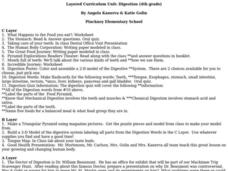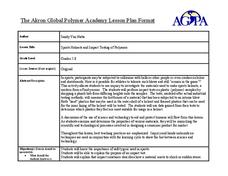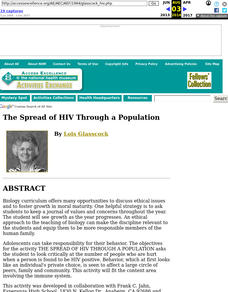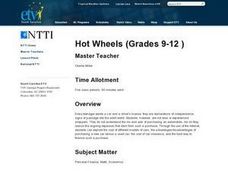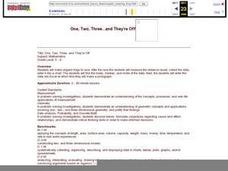University of Minnesota
Blind Spot
Your eyes each work independently, so how do we only see one image? The quick hands-on experiment encourages young scientists to test their blind spots on each eye individually. After learning where the blind spot is and why it exists,...
Curated OER
Stories That Grow on Trees
Students create their own plot-choice story after reading and discussing a commercially published plot-choice book.
Curated OER
We Are Having a Party! Part II
Second graders, in groups, participate in a four-station rotation model to solve problems. They use coins and dice for stations one, two, and three.
Curated OER
How to Stay Healthy in College
Pupils plan ways to develop and maintain a healthy lifestyle while in college. They keep a food log and cooperate as peer editors to make food choice suggestions for healthier eating. Students also consider the role of exercise in...
Curated OER
Planning a Healthy City
Ninth graders create a scaled model city. They create a blueprint that provides for the economic and cultural needs of a community. They identify where essential elements of the city should be located and explain the rationale for the...
Curated OER
Comparing Fractions 1
In this comparing fraction worksheet, students observe models and identify the fractions that the models depict. They compare fractions by determining which fraction is greater, less or equal. All problems are multiple choice.
Curated OER
Castles and Fortresses of the World
Students work in groups to study castlers and fortresses of the world. They study pictures and models of well known castles and fortresses. Students construct a 3-D model of a castle or fortress using materials of their choice.
Curated OER
Teaching About Inherited Human Disorders Through Case Studies
Students explore case studies involving human disorders. They identify options and consequences of each decision. Students interview a family member with a disorder. They create a presentation of their interview.
Curated OER
"Filler-Up" with Premium Fuel
Students investigate nutrition guidelines and recommendations to present what the information to their class. Based on their assessment of current habits, they determine which areas they would like to improve to reach goals for good...
Curated OER
Digestion
Fourth graders answer the question what happens to the food you eat? They complete a worksheet about the food you eat. They discuss the different types of teeth that we have. Students complete digestion poster in which they color and...
Curated OER
East Meets West
Students explore the influences of culture in food choices and customs. They compare and contrast information to create a menu using a Web site and Student Writing Center. Suggestions for creating an on-line graphic organizer as well as...
Curated OER
Sports Helmets and Impact Testing of Polymers
Learners examine the importance of good quality safety gear. In this investigative lesson, students will tests various polymers, collect data, and analyze the data to determine which polymer is best for safety helmets. They will design a...
Curated OER
The Spread of HIV Through a Population
Students use a model to illustrate the spread of HIV through an adolescent population and, acting in the role of epidemiologists, explore the dilemmas of HIV infection presented by the simulation. beneficence and justice.
Curated OER
A Royal Charter From the King
Fifth graders explore the many decisions that early colonist had to make when coming to North America. In this royal charter lesson plan, 5th graders work in teams to create a proposal for the King of England to establish a new colony in...
Curated OER
Graphing with Stems-and -Leafs
Fourth graders examine the use of stem and leaf graphs. In this stem and leaf graph lesson, 4th graders participate in teacher led lesson showing the use of the graphs. They work in groups to collect data about peanuts before making a...
Curated OER
Hot Wheels (Grades 9-12 )
Using internet research, students compute the costs of different models of card. They discuss the advantages/disadvantages of purchasing a new car versus a used car, the cost of car insurance, and the best way to finance their purchase.
Curated OER
A Penny Saved is a Penny Earned
Students explore the concept of exponential growth. In this exponential growth lesson, students manipulate power models with base 2. Students discuss what would happen if you doubled a penny over the course of 20 days. ...
Curated OER
Memory and Learning
Students identify parts of the brain and what each part does. In this brain anatomy lesson, students participate in activities that focus on the job of each part of the brain co connect the task to the brain section. Students make a...
Curated OER
One, Two, Three...and They're Off
Students make origami frogs to race. After the race they measure the distance raced, collect the data, enter it into a chart. They then find the mean, median, and mode of the data. Next, students enter this data into Excel at which time...
Curated OER
Let's Trade
Second graders engage in a lesson which focuses on adding two-digit numbers and the regrouping process. They identify when the regrouping process is necessary and make appropriate "trades" to complete an addition problem.
Curated OER
Lobster Roll!
Students collect data by playing a game that illustrates the delicate ecological balance between fishing, fishing regulations and fish populations. They graph and analyze the data and explain how economic decisions can affect the...
Curated OER
Biology Biographies
Students create a project about a famous Biologist in order to appreciate the humanity of the people involved in doing science. They create scientist biography "cards" roughly modeled after baseball cards or create a scrapbook of a...
Curated OER
Exploring the Self
Learners examine a variety of songs, poems, and books exploring and analyzing the theme of self reliance and being true to one's self. They write a poem, essay, or letter that captures their true spirit and individuality and then they...
Curated OER
Self-Advocacy During the IEP Conference
Students utilize self-advocacy procedures during the IEP conference. They explore how the "IPARS" are designed to prompt a self-instructional process when getting ready for IEP conferences. The teacher models the steps of the strategy...











